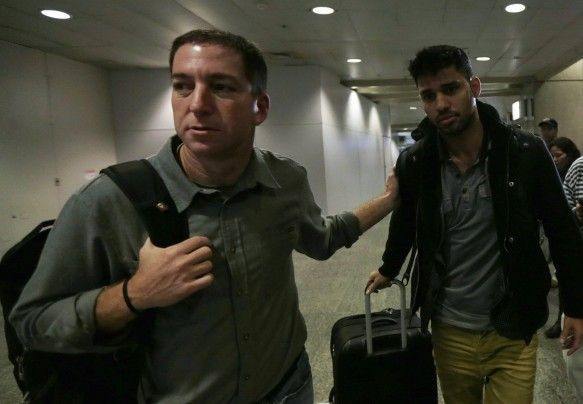
After David Miranda, the 28-year-old Brazilian partner of Guardian journalist Glenn Greenwald -- author of a series of stories revealing the existence of secret surveillance programs at the U.S. National Security Agency (NSA) and the British intelligence agency Government Communications Headquarters (GCHQ) -- was detained for nine hours at a London airport en route to his home in Rio de Janeiro, Greenwald said it's possible that Brazilian authorities' explosive reaction to the events is the only reason why his partner wasn't arrested. Miranda was held by UK authorities at the Heathrow airport under Schedule 7 of the Terrorism Act 2000 for nine hours, during which his laptop, mobile phone, video game consoles, DVDs and USB sticks were confiscated, according to the Guardian.
"David is smart and strong," Greenwald told blog Firedoglake. "But still, it was scary: Guardian lawyers were speculating all day that given how much time he was held - which is very rare - he'd possibly be arrested under a terrorism statute." He added, "It's speculation, but I think the only reason that didn't happen was because Brazilian government at high levels intervened so aggressively and angrily."
According to British government figures, over 97 percent of those stopped under the Terrorism Act 2000 are held for less than an hour, and only one of every 2,000 detainees are held for more than six hours. Mirando remained in detention for nine hours -- the longest amount of time the law permits police to hold individuals.
The Brazilian government released a statement on Sunday expressing "grave concern" about the incident. "This measure is without justification since it involves an individual against whom there are no charges that can legitimate the use of that legislation," it said. "The Brazilian Government expects that incidents such as the one that happened to the Brazilian citizen today do not repeat."
Miranda was on his way back from Berlin, where he was visiting Laura Poitras, an American filmmaker who has been helping Greenwald and the Guardian sift through the files that former NSA intelligence analyst Edward Snowden had leaked to them. The Guardian journalist and his team have said they are not interested in executing a WikiLeaks-style, large-scale dump of information, and that they are picking carefully through the stash.
"I do not want to help other states get better at surveillance," Greenwald told the Daily Beast in June, adding, "We won't publish things that might ruin ongoing operations from the U.S. government that very few people would object to the United States doing."
According to the reports Greenwald published in the Guardian using the Snowden files, Brazil was one of the American agency's most spied-upon countries, with the NSA calling on international telecommunications firms to hand over vast troves of data on Brazil's 200 million citizens. When U.S. Secretary of State John Kerry met with Brazilian Foreign Minister Antonio Patriota at the South American nation's capital of Brasilia last Tuesday, Patriota gave voice to the indignation that has been simmering in Brazil since the revelations were made, telling Kerry the spying posed "a new type of challenge" to the two countries' relationship and that "listening to explanations doesn't mean accepting the status quo."
RELATED: Bolivia President Evo Morales Says He Felt 'Kidnapped' After Plane Searched For NSA Leaker Edward Snowden
© 2025 Latin Times. All rights reserved. Do not reproduce without permission.




